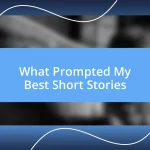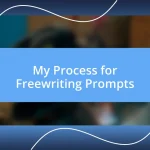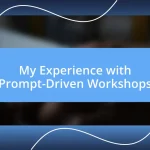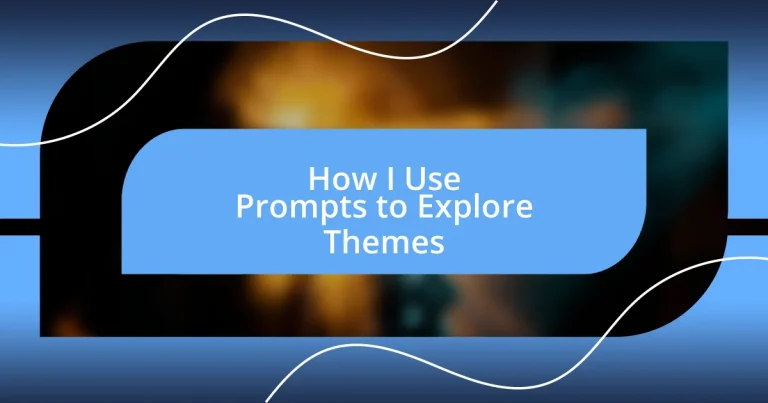Key takeaways:
- Prompts enhance creativity and introspection by unlocking deeper connections and challenging initial assumptions about themes.
- Different types of prompts, such as reflective and imaginative, enrich understanding and personal growth by inviting diverse perspectives.
- Analyzing responses to prompts reveals emotional patterns and growth over time, transforming past experiences into sources of strength and insight.
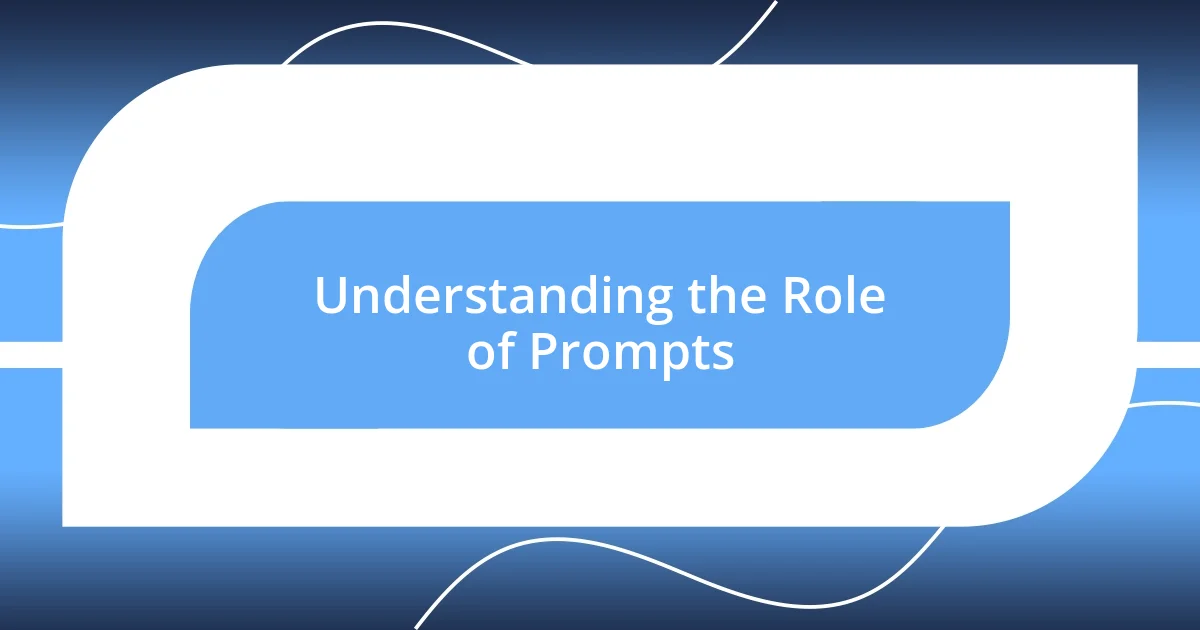
Understanding the Role of Prompts
Prompts serve as a compass in the expansive landscape of themes, guiding us through our thoughts and experiences. I remember the first time I used a writing prompt—it was like a light switch flicked on. Suddenly, ideas flowed, and I found connections I hadn’t considered before. Isn’t it fascinating how a simple question or phrase can unlock such depth?
When I delve into various themes using prompts, I often feel like I’m unearthing layers of understanding. Each prompt pushes me to examine my feelings and perspectives. Have you ever felt that rush of realization when a prompt strikes a chord within you? It’s an emotionally invigorating experience, enriching my creative process and inviting introspection.
Moreover, prompts challenge me to think beyond my initial assumptions. I’ve noticed that the right prompt can completely redefine a theme in my mind. Picture this: I once tackled a prompt about resilience and found myself reflecting on personal struggles and triumphs. This journey reinforced how essential prompts are for digging deeper into the nuances of our thoughts. How else would we explore such intricate themes without them?
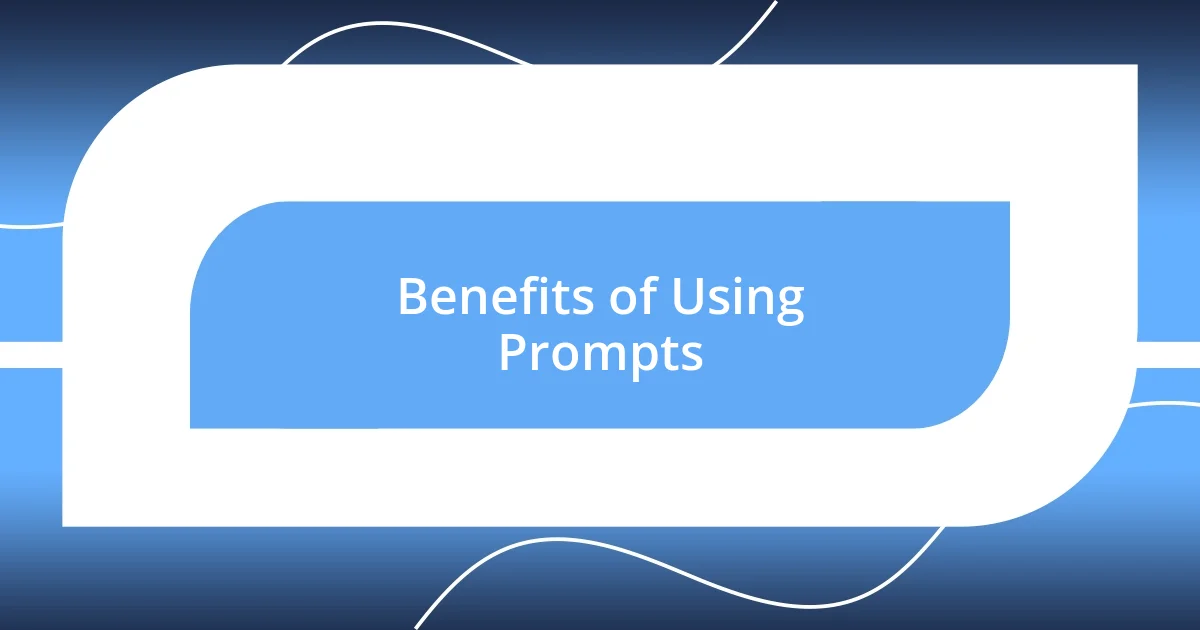
Benefits of Using Prompts
Using prompts offers a variety of benefits that can enhance our exploration of themes. For me, one of the primary advantages is the spark of creativity they ignite. I recall a time when I came across a simple prompt about “transformation.” It propelled me into a whirlwind of thoughts about personal growth, letting me see my experiences in a new light. This moment reminded me just how a single phrase can uplift our imaginative spirit.
Another significant benefit is that prompts can help break through writer’s block. I often find myself staring at a blank page, feeling stuck in my thoughts. A prompt can act as a lifeline, guiding me toward fresh ideas I hadn’t considered. On one occasion, I used a prompt that asked me to reflect on my childhood. As I pondered the memories, I effortlessly penned down more than I thought possible, effortlessly overcoming that daunting blankness.
Additionally, prompts encourage me to adopt different perspectives. This aspect is invaluable, especially when exploring complex themes. For instance, I once encountered a prompt asking how I would address my younger self. Writing this letter allowed me to tap into my vulnerabilities and lessons learned over the years. By embracing diverse viewpoints through prompts, our understanding of themes deepens and broadens.
| Benefit | Description |
|---|---|
| Spark Creativity | Prompts ignite new ideas, encouraging deeper exploration of themes. |
| Overcome Writer’s Block | They provide a starting point when feeling stuck, leading to unexpected insights. |
| Diverse Perspectives | Encourages looking at themes from various viewpoints, enriching understanding. |
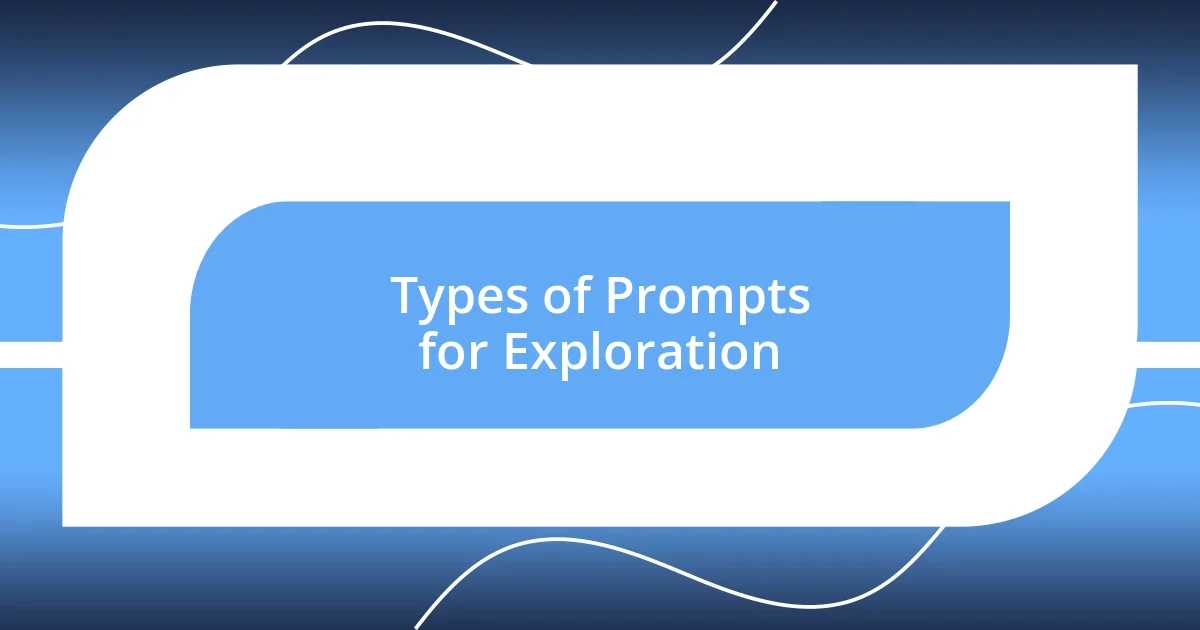
Types of Prompts for Exploration
Exploring themes through different types of prompts can profoundly enrich my understanding and creativity. I’ve noticed that prompts can be categorized in several ways, each offering unique insights. For instance, I often gravitate toward reflective prompts that invite me to examine my values or life choices. They have a way of stirring emotions and often lead to unexpected revelations. One time, a prompt about “what success means to me” compelled me to confront my own metrics for achievement, ultimately reshaping how I view my journey.
Here are a few types of prompts I frequently use:
- Reflective Prompts: These make me think deeply about past experiences and their implications.
- Imaginative Prompts: Often whimsical, these push me to envision new possibilities, such as “What if I could live in any time period?”
- Descriptive Prompts: These invite vivid imagery, helping me articulate feelings more vividly, for instance, “Describe a moment when you felt pure joy.”
- Analytical Prompts: These challenge me to dissect themes from various angles, like “What are the underlying factors in your biggest challenge?”
- Comparative Prompts: I find these particularly useful for assessing dilemmas or themes. For example, “How does love compare to friendship in your life?”
By engaging with different prompt types, I can navigate the intricacies of my thoughts and emotions more effectively. Each prompt uniquely contributes to my personal growth, inviting me to explore themes that resonate on a deeper level.
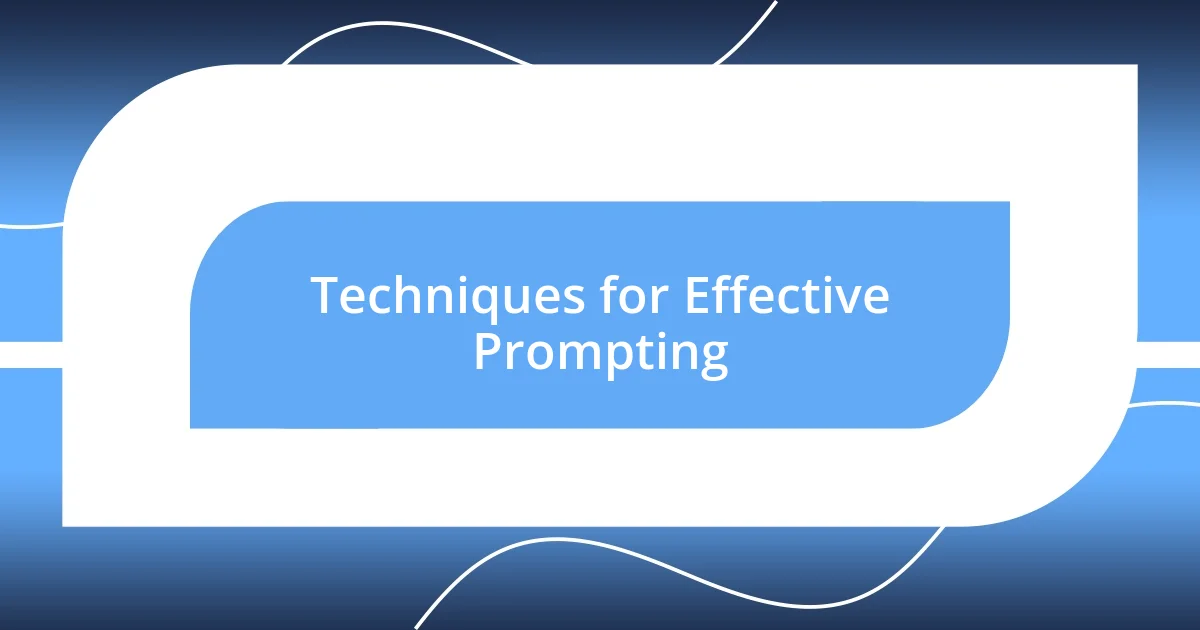
Techniques for Effective Prompting
One effective technique I found is to tailor prompts to fit my emotional state. When I’m feeling particularly overwhelmed, I might choose a prompt that focuses on vulnerability. Reflecting on a moment of sadness can often lead me to surprising insights. For instance, when prompted to think about a time I felt let down, I uncovered layers of my expectations and how they shape my relationships. Isn’t it fascinating how peeling back those emotional layers can open up a whole new world of self-awareness?
Another powerful method is to create hybrid prompts that blend different themes or concepts. I recall a time when I merged the ideas of “fear” and “aspiration.” This combination allowed me to explore what holds me back while also illuminating my dreams. The prompt pushed me to confront my personal barriers honestly, which sparked a meaningful dialogue with myself. I always wonder how such simple variations can yield profound discoveries.
Lastly, I often integrate sensory details into my prompts to immerse myself fully in the experience. For instance, I once crafted a prompt around the smell of rain to evoke memories tied to that scent. This sensory connection transported me back to childhood afternoons spent splashing in puddles, which deepened my reflection on joy and freedom. Have you ever considered how sensory memories could enrich your exploration of themes? It’s a simple yet effective technique that brings a vividness to my writing.
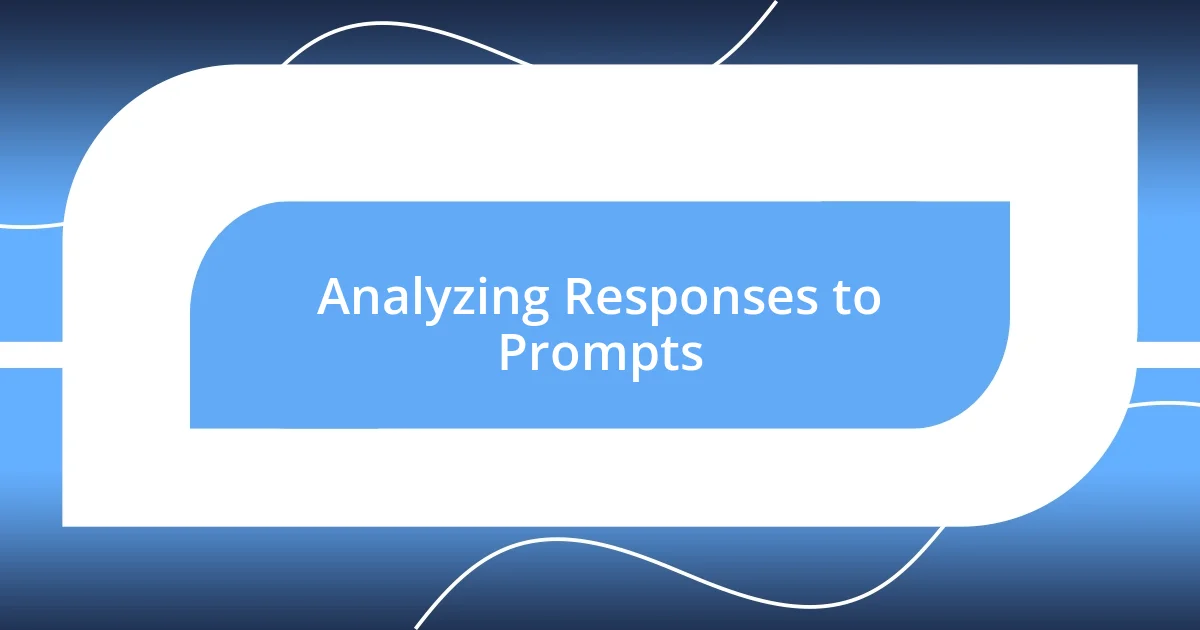
Analyzing Responses to Prompts
When I analyze my responses to prompts, I often look for patterns that reveal my emotional landscape. For example, after reflecting on prompts about family, I noticed how my responses swung between warmth and frustration. This duality encouraged me to explore how my background shapes my relationships today. Have you ever found that your feelings toward certain themes are more complicated than you first thought?
I’ve learned that breaking down my responses helps me uncover deeper meanings behind my words. Once, after addressing a prompt about failure, I initially focused on external circumstances. Yet, upon closer examination, I recognized my fear of not living up to my own expectations. That realization was both enlightening and disheartening; it forced me to confront my inner critic. Have you ever felt that your biggest obstacles lie within rather than outside you?
Additionally, I make it a point to revisit my past entries to see the growth over time. I once wrote a reflective piece on trust, and years later, reading it back resonated differently. I could practically see my evolution from skepticism to openness. It made me wonder: how much does our journey influence our understanding of recurring themes? Analyzing past responses not only maps my growth but also fuels my desire to keep exploring.
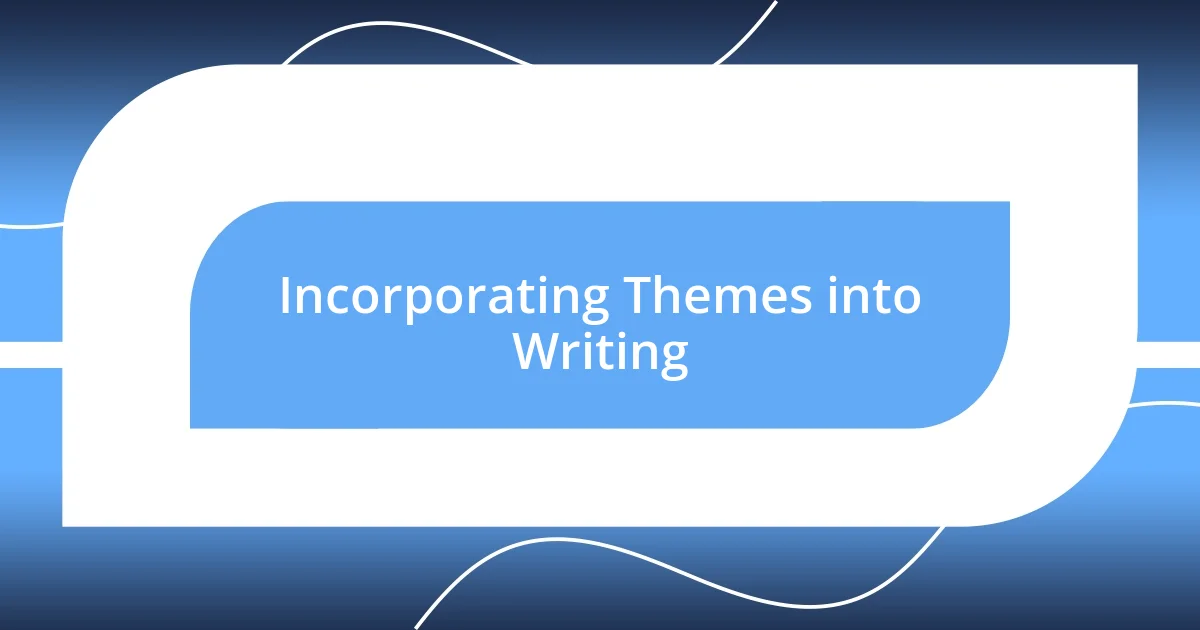
Incorporating Themes into Writing
Incorporating themes into my writing often feels like weaving a tapestry of personal experiences. Recently, I wrote about the theme of resilience after reflecting on my journey through a challenging project. As I put pen to paper, I realized how each setback, each moment of doubt, strengthened my resolve. It’s amazing how diving deep into a theme can reveal the threads of our lives that connect us to our past; have you ever noticed how certain themes resonate with your own experiences?
Another approach I’ve found helpful is to juxtapose themes against each other to enrich my narrative. For instance, during one writing session, I explored love alongside loss. This contrast allowed me to articulate the bittersweet nature of cherished memories. It struck me how our happiest moments often coexist with the pain of what we can’t hold onto. Doesn’t it give depth when we understand that love is sometimes intertwined with loss?
On occasion, I harness the power of dialogue within my writing to bring themes to life. I remember a time when I created a fictional conversation between my younger self and my present self about fear. It was incredible to articulate how my fears have evolved over the years. This technique not only clarifies my understanding of a theme but also invites readers to reflect on their own experiences. Isn’t it fascinating how a simple dialogue can illuminate complex emotions?
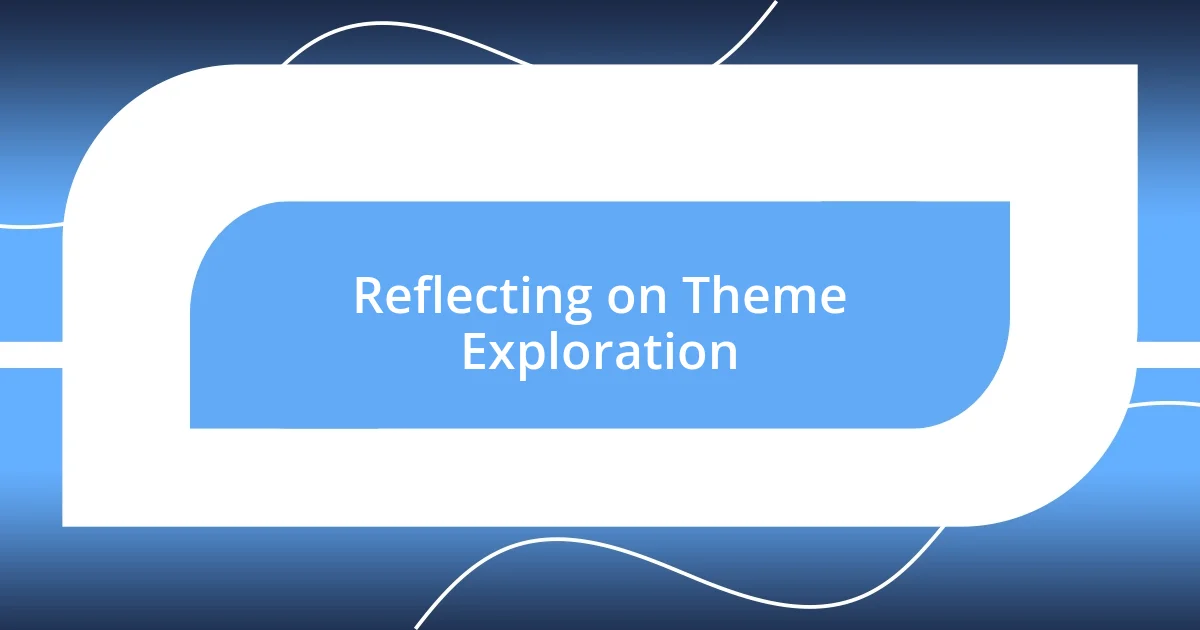
Reflecting on Theme Exploration
Reflecting on my theme exploration has shown me how nuanced my emotions can be. I remember a time when I was prompted to think about belonging. Initially, I approached it with a sense of nostalgia, but as I delved deeper, I discovered feelings of alienation and the struggle to fit in. It made me wonder: how often do we gloss over the darker shades of our experiences to focus only on the expected narrative?
One of the most striking revelations came when I revisited a piece I wrote on identity. My reflections took me back to a pivotal moment in my teenage years when I felt utterly lost. Reading it years later made me appreciate how those feelings shaped my current self. I found myself asking, how do those formative experiences continue to color our perceptions of ourselves today?
I often sit with my thoughts after reflecting on themes, allowing them to simmer. Recently, I pondered love’s complexities while walking a familiar path. It struck me that memories flooded back, revealing the joy and heartache intertwined in my journey. I even caught myself smiling at some bittersweet memories that once brought pain. Isn’t it intriguing how reflecting on themes can turn what once felt heavy into a source of strength?



